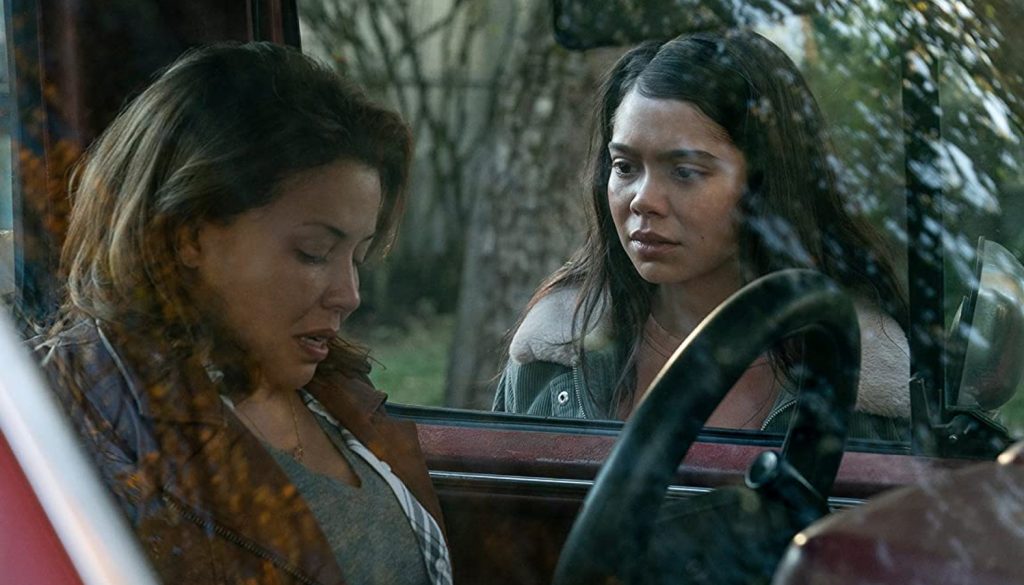Amber Appleton and her mom read the Emily Dickinson poem “ ‘Hope’ is the Thing with Feathers” before bed each night.
“I’ve heard it in the chillest land / And on the strangest Sea,” reads Amber.
“Yet — never — in Extremity / It asked a crumb — of me,” her mother finishes.
Hope is one of the few things the Appletons still have. Working around the clock all day and sleeping in a school bus at night, they have almost nothing to call their own except some backpacks and each other. “All Together Now,” one of Netflix’s latest original films, tells the story of how Amber, a high school drama talent who dreams of attending Carnegie Mellon University, must cope with financial and family struggles simmering behind her constant smile.
In this 93-minute drama from director Brett Haley, Auli‘i Cravalho as Amber immediately draws the audience in. Bright-eyed and expressive, she demonstrates a striking ability to flip from joy to dejection and back again. Meanwhile, Justina Machado as Becky Appleton deftly presents the complex emotions of a mother who is both devoted and desperate.
Besides an impressive acting display, “All Together Now” also delivers an often overlooked message about hope.
The film’s most prominent message, highlighted in its synopses and trailer, is a valuable one on its own: the importance of accepting help from others. In the midst of their daily worries, Becky refuses to seek assistance or even tell others about their situation, out of fear of being judged a bad parent, or worse, losing custody of her daughter. And when Amber falls into a similar pattern of behavior, her friend Ty (Rhenzy Feliz) diagnoses her mindset: She, too, fears that accepting help would be a mark of weakness. Through a gripping plot and dialogue, the film shows that leaning on others fosters friendship and joy, whereas going at it alone breeds misery.
At the same time, Amber’s story gives rise to another theme: less prominent, but just as important, if not more so. It stems directly from the Dickinson poem.
When we meet Amber, her tenacious hold on hope is almost incomprehensible. When her mom whispers before falling asleep, “We’re going to be OK,” she refuses to settle for just OK. “We’re going to be great,” says Amber. “We’re going to be spectacular.”
What we don’t know about Amber’s hope is why she holds on to it. Excessive confidence? Blind optimism that will fade when faced with a new wave of hardship? Amber’s story gives reason to believe otherwise.
We soon learn that life was not always in shambles for the Appletons. Before her father’s tragic death, Amber’s parents had a happy marriage and loving family life. And even now, after Becky’s grip on life has slackened, she remains dedicated to her daughter.
These details point to the reason for Amber’s hope: Because she has experienced the support of home and family, she believes that she can regain it. As long as she knows that she is not alone and is not meant to be alone, she can take on each taxing day and each uncomfortable night with a sporting spirit.
However, once that sense of support is gone — and once she begins to push it away — her hope quickly gives way to frustration, fear, and despair.
This progression teaches an important lesson for all viewers, whatever kind of hardship they might face. It demonstrates that while solo perseverance, or “pulling yourself up from your bootstraps,” has value to an extent, it cannot get one across the finish line. As social beings born into families and communities, we rely on one another to face life’s ups and downs and overcome our challenges.
This is why asking for help, either human or divine, is so important: not because it makes us weak, but because it is the only way we can overcome weakness.
“All Together Now” shows that hope doesn’t come from nowhere, and certainly not from ourselves. If it did, it would be short-lived. And life is too short to live without hope.
“All Together Now” is available for streaming on Netflix.

